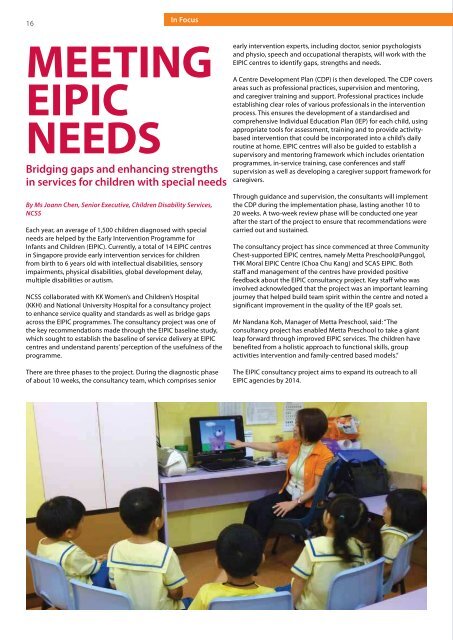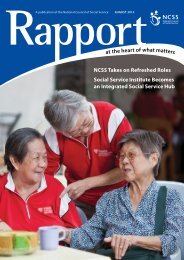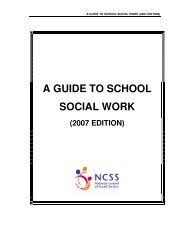READ MORE - National Council of Social Service
READ MORE - National Council of Social Service
READ MORE - National Council of Social Service
You also want an ePaper? Increase the reach of your titles
YUMPU automatically turns print PDFs into web optimized ePapers that Google loves.
16<br />
In Focus In Focus<br />
17<br />
MEETING<br />
EIPIC<br />
NEEDS<br />
Bridging gaps and enhancing strengths<br />
in services for children with special needs<br />
By Ms Joann Chen, Senior Executive, Children Disability <strong>Service</strong>s,<br />
NCSS<br />
Each year, an average <strong>of</strong> 1,500 children diagnosed with special<br />
needs are helped by the Early Intervention Programme for<br />
Infants and Children (EIPIC). Currently, a total <strong>of</strong> 14 EIPIC centres<br />
in Singapore provide early intervention services for children<br />
from birth to 6 years old with intellectual disabilities, sensory<br />
impairments, physical disabilities, global development delay,<br />
multiple disabilities or autism.<br />
NCSS collaborated with KK Women’s and Children’s Hospital<br />
(KKH) and <strong>National</strong> University Hospital for a consultancy project<br />
to enhance service quality and standards as well as bridge gaps<br />
across the EIPIC programmes. The consultancy project was one <strong>of</strong><br />
the key recommendations made through the EIPIC baseline study,<br />
which sought to establish the baseline <strong>of</strong> service delivery at EIPIC<br />
centres and understand parents’ perception <strong>of</strong> the usefulness <strong>of</strong> the<br />
programme.<br />
There are three phases to the project. During the diagnostic phase<br />
<strong>of</strong> about 10 weeks, the consultancy team, which comprises senior<br />
early intervention experts, including doctor, senior psychologists<br />
and physio, speech and occupational therapists, will work with the<br />
EIPIC centres to identify gaps, strengths and needs.<br />
A Centre Development Plan (CDP) is then developed. The CDP covers<br />
areas such as pr<strong>of</strong>essional practices, supervision and mentoring,<br />
and caregiver training and support. Pr<strong>of</strong>essional practices include<br />
establishing clear roles <strong>of</strong> various pr<strong>of</strong>essionals in the intervention<br />
process. This ensures the development <strong>of</strong> a standardised and<br />
comprehensive Individual Education Plan (IEP) for each child, using<br />
appropriate tools for assessment, training and to provide activitybased<br />
intervention that could be incorporated into a child’s daily<br />
routine at home. EIPIC centres will also be guided to establish a<br />
supervisory and mentoring framework which includes orientation<br />
programmes, in-service training, case conferences and staff<br />
supervision as well as developing a caregiver support framework for<br />
caregivers.<br />
Through guidance and supervision, the consultants will implement<br />
the CDP during the implementation phase, lasting another 10 to<br />
20 weeks. A two-week review phase will be conducted one year<br />
after the start <strong>of</strong> the project to ensure that recommendations were<br />
carried out and sustained.<br />
The consultancy project has since commenced at three Community<br />
Chest-supported EIPIC centres, namely Metta Preschool@Punggol,<br />
THK Moral EIPIC Centre (Choa Chu Kang) and SCAS EIPIC. Both<br />
staff and management <strong>of</strong> the centres have provided positive<br />
feedback about the EIPIC consultancy project. Key staff who was<br />
involved acknowledged that the project was an important learning<br />
journey that helped build team spirit within the centre and noted a<br />
significant improvement in the quality <strong>of</strong> the IEP goals set.<br />
Mr Nandana Koh, Manager <strong>of</strong> Metta Preschool, said: “The<br />
consultancy project has enabled Metta Preschool to take a giant<br />
leap forward through improved EIPIC services. The children have<br />
benefited from a holistic approach to functional skills, group<br />
activities intervention and family-centred based models.”<br />
The EIPIC consultancy project aims to expand its outreach to all<br />
EIPIC agencies by 2014.<br />
DIFFERENT<br />
ABILITIES, SAME<br />
MOTIVATIONS<br />
Job placement programmes for people with disabilities<br />
NCSS is committed to help persons with<br />
disabilities find meaningful employment<br />
opportunities. One such initiative is<br />
the Job Placement Job Support (JPJS)<br />
programme managed by MINDS. The<br />
objective <strong>of</strong> the programme is to promote<br />
the employment and retention <strong>of</strong> persons<br />
with intellectual disabilities in the open<br />
job market. Since its inception two<br />
years ago, the programme has helped<br />
more than 60 clients find new purpose<br />
and confidence through positive work<br />
experiences.<br />
OVERCOMING THE ODDS<br />
When Ms Masni Bte Miswari, who was diagnosed with intellectual<br />
disability, first applied to be a kitchen stewardess at the Holiday<br />
Inn Atrium through the JPJS programme, her potential employers<br />
were concerned that she would not be able to handle the heavy<br />
workload at their staff canteen’s dishwashing station.<br />
After training and support from her supervisors and the JPJS team<br />
at MINDS, her work performance made a favourable impression on<br />
her employers.<br />
Her exemplary success led to more open doors. The JPJS team<br />
facilitated more job placements with Holiday Inn Atrium and<br />
Ms Masni was subsequently joined by Ms Lee Yen Jun and<br />
Ms Joanne Ang (shown in photo).<br />
As a group, the girls had the additional challenge <strong>of</strong> managing the<br />
dishwashing station on their own. However, their performance<br />
and abilities earned them their employers’ praise, who highlighted<br />
their exceptional attitude and independence.<br />
IMPORTANCE OF SUPPORT<br />
The management team at Holiday Inn Atrium played an important<br />
role in giving the girls the motivation and resolve to perform well.<br />
For example, accommodation was made for them to use padlock<br />
lockers instead <strong>of</strong> the more complex combination locks.





